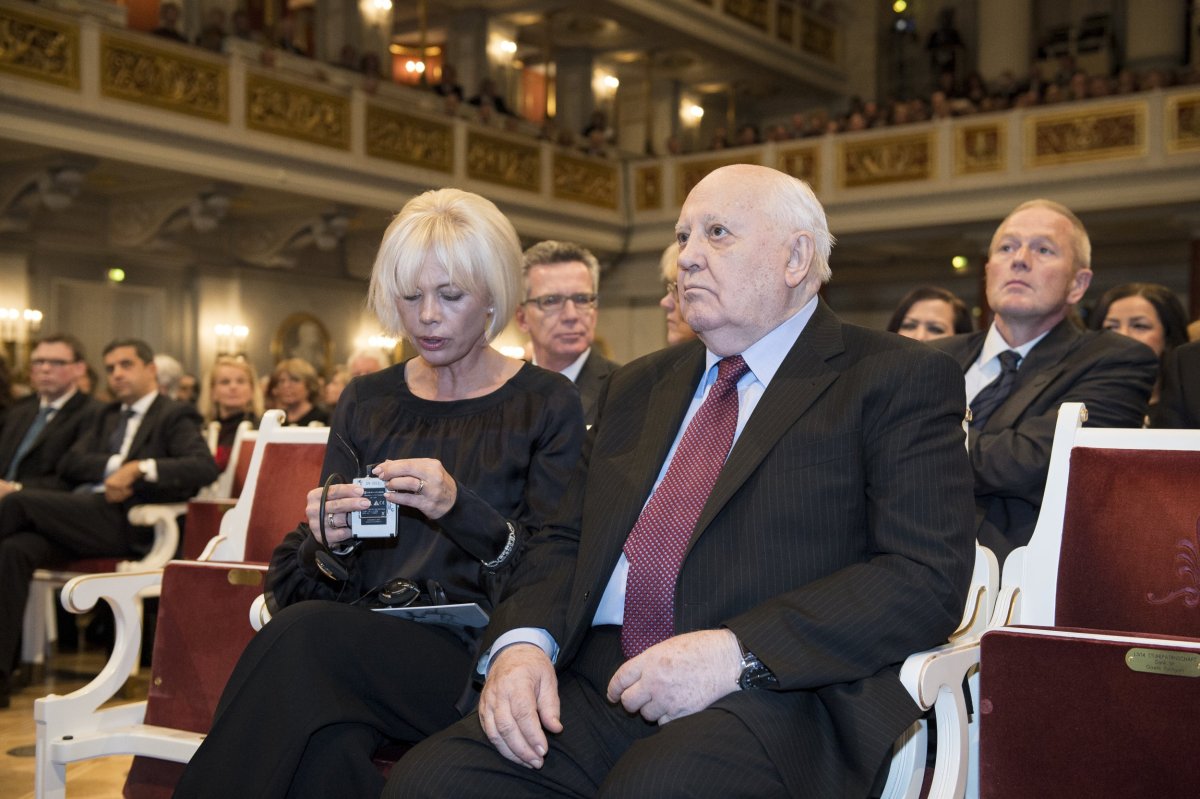Mikhail Gorbachev, the Soviet Union's last leader, has weighed in on the mounting standoff between the U.S. and Russia over Syria, criticizing world leaders for a lack of dialogue over how to end the conflict.
Gorbachev spoke to Russian news agency Interfax amid threats from U.S. President Donald Trump about a military strike on Syria after a suspected chemical attack in the country, blamed on President Bashar al-Assad, in the rebel-held province of Douma, near the capital city of Damascus. On social media, Trump warned Russia—which is backing Assad—that the United States has "nice, new and smart" missiles that it may use in response to the attack.
Russia, meanwhile, has threatened to shoot down any U.S. missiles fired in Syria and even to strike U.S. launching sites. The exchange has provoked fears of open warfare between the U.S. and Russia and comparisons to the 1962 Cuban missile crisis, when the two countries came close to nuclear war after Soviet leader Nikita Khrushchev installed missiles on Cuba.
Gorbachev, who presided over the breakup of the Soviet Union in the early 1990s, said the standoff is not yet quite as tense as 1962 but is alarming nonetheless.
Related: Gorbachev on why the Soviet Union collapsed a why Putin's popularity is so high
"We have not had this in a long time, and I am very disappointed by the way today's leaders are going about business," he said in the interview with Interfax earlier this week.
Gorbachev accused leaders of an "inability to carry out dialogue," which has turned international relations into "an exchange of mutual accusations, sanctions and even military strikes."
Gorbachev called on leaders to meet soon and bolster dialogue to de-escalate tensions. "They must meet halfway as soon as possible, but comprehensively. One, two days of serious conversation, with the participation of the foreign and defense ministers."

Related: Russia calls alleged Syria attack "fake," staged in smear campaign
"At the moment, another problem is particularly relevant—preventing incidents between the American and Russian armed forces or military kit. I am convinced that nobody wants war, but such incidents in today's charged atmosphere can lead to big trouble," he said.
"I think one of the reasons is people have not yet realized the full severity of the situation and they have not yet pressed the leaders," Gorbachev said, not naming who he thought should exert this influence over the Russian and U.S. leaders. "We need a new version of the anti-war movement, not for them to judge, trade blame against one side or another but to demand that leaders begin serious dialogue and rid the world of this threat hanging overhead."
Both Washington and Moscow have claimed that the levels of mistrust between the two governments today are comparable to Cold War relations. The U.S. and Russian governments are at loggerheads in two armed conflicts, backing opposing sides in Ukraine and Syria, while the scandal around Russian interference in the 2016 election has only deepened the rift between Moscow and Washington.
Trump has largely refrained from criticizing Russia, and specifically President Vladimir Putin, for Moscow's support for Assad, although he recently tweeted that Russia "shouldn't be partners with a Gas Killing Animal who kills his people and enjoys it!" Russian officials, meanwhile, have previously complained that the U.S. has rebuffed their attempts to set up an official meeting between Trump and Putin. However, prior to his dismissal last month, form Secretary of State Rex Tillerson said U.S. reluctance stemmed from a skepticism that Russia actually intended to have a "meaningful meeting."
Speaking to Newsweek, Steven Pifer, a former U.S. ambassador to Ukraine, praised this policy, noting that the optics of an amicable but fruitless meeting would benefit the Kremlin, keen to promote itself as a global power, but could be detrimental to the Trump White House.
"President Putin would gain simply by having face time with President Trump," Pifer said. "It would help bolster his image as a key international 'player.' A substance-free meeting, on the other hand, would do nothing for Mr. Trump, given questions at home about contacts between his campaign and Russian officials."
Uncommon Knowledge
Newsweek is committed to challenging conventional wisdom and finding connections in the search for common ground.
Newsweek is committed to challenging conventional wisdom and finding connections in the search for common ground.
About the writer
I am a Staff Writer for Newsweek's international desk. I report on current events in Russia, the former Soviet Union ... Read more
To read how Newsweek uses AI as a newsroom tool, Click here.








